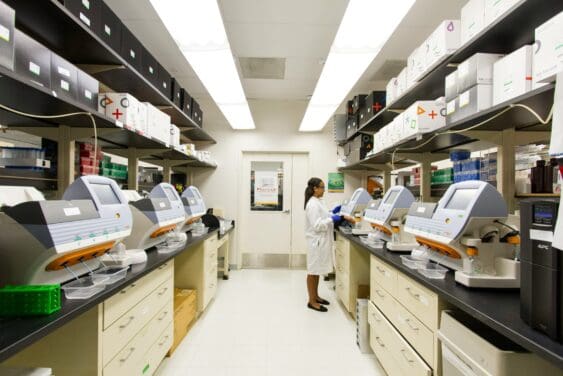Whether you’re moving within the same building or across the country, here are seven essential best practices that will ensure your next lab relocation goes smoothly, with minimal disruption to your research and operations.
1. Work with Experienced Experts
Laboratory relocations require specialized knowledge. To guarantee a successful move, it’s crucial to work with a team that understands the complexities of lab environments. Choose a service provider with experience in life sciences, one that is well-versed in lab protocols, and has the necessary tools and equipment, like specialized moving trucks, protective materials, and tools designed for sensitive lab equipment. By choosing a fully integrated service provider, you streamline the process, ensuring consistent results and reducing the risk of mistakes.
2. Assign Clear Leadership on Both Ends
Leadership is key to a smooth relocation process. Appoint a point person within your organization to work directly with the relocation team. These individuals will ensure clear communication and fast decision-making, keeping the project on track. Having leaders on both sides of the move allows for efficient problem-solving and ensures that critical decisions are made promptly, minimizing delays.
3. Get Your Lab Organized and Utilize Asset Management Tools
The more organized you are internally, the smoother the move will be. Prior to relocation, ensure you have detailed records of all lab equipment, samples, and materials. Partnering with an asset management provider that offers real-time tracking will ensure that every item is accounted for during the move. Combining your internal organization with the expertise of professionals ensures a streamlined relocation, protecting your assets throughout the process.
4. Protect Your Temperature-Sensitive Samples with Cold Chain Experts
For labs handling biological or temperature-sensitive materials, cold chain management is essential. When relocating samples, it’s critical to engage specialists who can ensure your specimens are kept at the right temperature throughout the move. Look for providers with transport trucks equipped with backup generators, real-time temperature monitoring, and insulated storage solutions to safeguard your samples.
5. Ensure Compliance with Local, National, and International Regulations
Laboratory relocations often involve navigating a complex landscape of regulatory requirements. Whether you’re moving across state lines or internationally, ensure that your service provider is well-versed in national and international compliance standards. A provider who understands the specific regulations governing lab relocations can help you avoid costly delays and ensure your move meets all legal requirements. Plus, the right provider will offer insurance to protect your assets during the relocation process.
6. Have Expert Storage Solutions in Place
Sometimes, a move requires temporary storage for your lab equipment and materials. Partnering with a provider that offers in-house, conditioned storage facilities ensures that your assets remain secure and in optimal conditions. Look for a provider with experience in cold chain storage and biorepositories to ensure your materials are kept at the required temperatures until they reach their final destination.
7. Consider Hazmat and Decommissioning Expertise
In some cases, your laboratory relocation may involve hazardous materials or equipment decommissioning. Choose a service provider that is licensed and equipped to handle hazardous materials in compliance with all safety regulations. This includes properly handling chemicals, biological materials, and decommissioning lab equipment. Working with a provider who has specialized knowledge in these areas will give you peace of mind and ensure that the relocation is carried out safely.
Plan for Success with Laboratory Movers
Relocating a lab involves much more than just moving boxes—it’s about ensuring the integrity of your work, minimizing downtime, and staying compliant with all regulatory requirements. By following these seven best practices, you can streamline the process and set your laboratory up for success in its new location.
If you’re planning a laboratory relocation, contact Laboratory Movers today for a consultation. Our team of experts is ready to assist with every aspect of your move, from temperature-sensitive sample transport to compliance and storage solutions.
